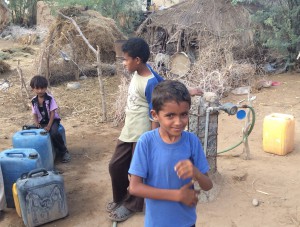18th August 2014 Sana’a, Yemen
World Humanitarian Day

Since the bombing of the UN headquarters in Baghdad in 2003, August 19 has been honoured as a day to remember those who face danger to help others. In 2014, more people than ever are in need of humanitarian assistance. With ongoing conflict in thirty three countries and an increasing number of natural disasters affecting millions, the world needs people who are willing to help save the lives and alleviate the suffering of others.
Today we pay tribute to the humanitarian workers here in Yemen where the scale of need is immense. Of the 28 million people in the Middle East in humanitarian need, over half that total number, are in Yemen. Humanitarian workers come from all over Yemen, and from overseas, to provide protection and assistance. These are people who face danger and disruption daily as they try to do their job. In addition to active conflict, a particular risk for humanitarian staff in Yemen is the risk of kidnap. Of all countries in the world where humanitarians are at work, Yemen is second only to Afghanistan for number of kidnappings of aid workers. And yet, incredibly, humanitarian workers in Yemen continue to serve in the face of all adversity.
Yemenis face difficult and often terrifying security conditions every day. Aid workers in Yemen live with knowing that every morning, they and international staff, whose friends and family are more used to navigating their way around the coffee shop first thing in the morning, put themselves in these positions every day to help others.
Without the work of humanitarian staff in Yemen, many more children would die from malnutrition. Many more people would suffer from disease associated with unclean water. Many more people would not have emergency shelter when they are displaced from their homes by conflict. Without those who are willing to put at risk their own safety and security for the sake of others, the UK and other donors would not be able to carry out their humanitarian programmes in the country.
We therefore pay particular tribute to the courage of Yemenis who provide aid and relief, helping fellow citizens, based on need alone, regardless of tribal or other affiliations. And we pay tribute to those who come to Yemen fromother countries.
The UK’s humanitarian programme in Yemen has committed USD116 million over two years. We are a trailblazer in multi-year funding, which allows chronic needs to be addressed rather than just the immediate response. This year aid workers have already reached over 318,000 people with the UK’s bilateral humanitarian aid. Over 55,000 received cash assistance; over 24,000 were provided with livelihoods assets and over 73,000 children were treated for severe acute malnutrition. None of this would have been possible without humanitarian partners to make it happen.
The UK’s aid response in Yemen is given through a number of humanitarian partners including international and national NGOs and the UN agencies. This year to mark World Humanitarian Day, the Secretary General of the United Nations, Ban Ki-moon has launched a campaign challenging people to sign up, take action and make a difference to humanity because more people than ever before need humanitarian help. www.worldhumanitarianday.org